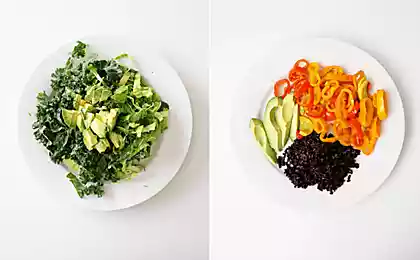515
How to save on food: tips
Products rose significantly, and the income most of us have remained the same. We have prepared a guide that will help you to eat more economically, but still delicious and satisfying.
No matter how the oil was pouring from the TV screens, they say, the government controls the prices of commodities from the food basket, the statistics — are stubborn things. According to Rosstat, at the end of 2014 the consumer confidence index of the population decreased by 11 percentage points and amounted to -18%. Most say the increase in food prices. The index of growth of prices over the past six months amounted to 15-20%. According to the poll, more substantial just went up sugar, whole grains, vegetables, fruits, milk, meat and fish. While every fifth Respondent (20%) admitted that he had to switch to cheaper products, and the purchase of some even refuse.
According to experts, prices will continue to rise. So, it's time to learn to save. We will tell you how to spend the least money on food.
Shop
1. Make a shopping list and strictly follow it. To do this, develop a menu for the week: breakfasts, Lunches and dinners. Inspect kitchen cupboards and refrigerator and make a shopping list of the ingredients, which is lacking to prepare the planned meals. Nothing more! Keep a shopping list will help mobile app: Myconomy, "Buy me a pie!" and others.
2. Compare prices in different stores. To buy everything in one supermarket, which is convenient. But sometimes, if you walk up to the bakery around the corner, you can get a more delicious and cheap bread.
If the monitoring is no time, try to shop once a week. "Buy cheese today, and tomorrow will go and buy eggs" — an approach leading to unplanned spending.
3. Attend agricultural fairs. Usually, they are held in the fall and spring, and there can be very profitable to buy farm products: potatoes, eggs and others.
4. Avoid impulsive purchases. Do not buy products not only because they are cheap or suddenly wanted: "Oh! Discount on cabbage! It is necessary to take, it is usually 10 rubles more expensive (sure it is?), "Mmm, cake! Want! I want!" (but what about the diet?).
Never store kids: "want" is more difficult to resist. One power will not save.
5. Use the discount card. Perhaps it will have to pay, but it is one-time spending, and discounts you can enjoy every time visiting this store.
6. Otovarivatsya wholesale. Flour, sugar, salt, pasta and spices are always needed. Plus they have a long shelf life. It means that you can take for the future. The wholesale outlets usually lower.
"Much more than I need? I have nowhere to put it," the typical objections of the hosts on the Board to buy the products large quantities. The solution is simple: otovarivatsya chipped with friends. Buying a package of rice and dividing it among themselves, you will quickly feel the benefit of this approach.
7. Look down. According to the rules of merchandising, the most expensive products are placed on shelves at eye level of the buyer, and the cheapest on the lower shelves. Do not be lazy to bend over and examine the lower range.
In addition, do not look to the departments that you don't need (divide the products in the list of groups: meat, vegetables and so on). And don't forget that the store should visit full.
8. Disconnect the autopilot. We often wander around the store, thinking about her, and mechanically folding the products in the cart. Remember, it's a shame when you find that the broken apples, and biscuits in the pack broken. Choose foods carefully.
9. Do not overpay for the name. Products of famous brands are more expensive. But this is not always a guarantee of quality and taste. Look to less famous, but cheaper counterparts. For example, commercial grades of chain stores. As a rule, the taste characteristics of the products (vegetable oil, grocery, etc.) do not differ from the branded one.
10. Do not overpay for packaging. Milk in a nondescript package can be tastier and cheaper beverage bottle and dry food in bulk is more profitable packaged in colorful boxes.
11. Pay attention to the grammovka and displacement. Often on the shelves is the same product but one is cheaper another, for example, 5 rubles. Not in a hurry to grab something cheaper. Compare the difference in the weight or volume of these products. More profitable to take the "full" pounds than 940 grams.12. Do not buy products. They are a priori more prepared independently (from "A" to "z") dishes. Don't let yourself be lazy: cook dumplings, stuffed cabbage and meatballs by themselves and store them in the freezer.
And again. Sliced bread and sausage is always more expensive. Can't you yourself cut the loaf?
13. Don't be afraid of delay. Discount policy network of food stores — a subject for separate discussion. But when the shelf life of the product expires, the sellers are willing to be truly generous. As a rule, the products of "timer" is quite suitable. The key is to use them as soon as possible.
Exception — dairy products. They are easy to get food poisoning, so it's best to buy only fresh.
14. Don't waste money on bottled water. Cheaper to buy one filter for cleaning.
15. Keep your receipts. They will help maintain the family budget.
The kitchen
1. Adjust the diet. For example, switch to poultry meat is significantly more costly instead of fresh fish. Substitute ingredients for cheaper when possible (salmon instead of trout, Adygei cheese instead of mozzarella).
2. Look at the offal. There's nothing like a juicy steak tenderloin, but the liver, heart and other offal can be cooked very tasty. Buy them from time to time instead of meat — save money and pumped culinary skill.
3. Follow cooking sites. There is often some budget recipes. Keep them for yourself. They will help you make a weekly menu and shopping list.
4. Prepare yourself what you can do at home. For example, brew. Shop a-liter bottle of the drink costs an average of 50 rubles. Three liters of home brew will only cost you 20 rubles.
5. Prepare for the season. Salad of fresh tomatoes and cucumbers in the winter can be costly. Cabbage and carrots at this time of year are much cheaper. Make a salad of them — it will be tasty and healthy.
6. Do not prepare too much. There are Housewives, whose "hand is not." If you cook soup in a large pan, if you fry the meatballs, the full pan. Such waste usually ends up with half cooked flies in the bin. Learn to cook as much as eat.
As a variant not culinarte until eaten cooked.
7. Do procurement. We are not talking about three-liter jars with pickles. At the current pace of life and urbanization is employment for everybody. But frozen greens and berries.
Chop finely the parsley, dill and any other favorite herbs, place in container and put in the freezer. Flavor is always at hand.
8. First use perishable foods. Bought yoghurt, put in the fridge, and five days later when I remembered about it and wanted to eat, it turned out that it is overdue. In the end, a few tens of rubles to go in the trash. Familiar?
Not to get more in such a situation, stick to perishables bright stickers: "eat until Thursday", "use the rest of the week" and so on.
9. Store products correctly. Compliance with the storage conditions prevents premature spoilage. Frugal what do you think about the food, the less you will have to replenish food stocks.
Speaking of thrift. Many products can be given a "second life". The bread started to dry? Make breadcrumbs and add to salads.
As you can see, to save on food, do not have to be a pedant. Follow these guidelines everyone can do. But the main thing — do not be fanatical in grocery savings. Sometimes you need to allow yourself something delicious or favorite. published
P. S. And remember, only by changing their consumption — together we change the world! © Join us at Facebook , Vkontakte, Odnoklassniki
Source: lifehacker.ru/2015/04/18/kak-ekonomit-na-produktah/
No matter how the oil was pouring from the TV screens, they say, the government controls the prices of commodities from the food basket, the statistics — are stubborn things. According to Rosstat, at the end of 2014 the consumer confidence index of the population decreased by 11 percentage points and amounted to -18%. Most say the increase in food prices. The index of growth of prices over the past six months amounted to 15-20%. According to the poll, more substantial just went up sugar, whole grains, vegetables, fruits, milk, meat and fish. While every fifth Respondent (20%) admitted that he had to switch to cheaper products, and the purchase of some even refuse.
According to experts, prices will continue to rise. So, it's time to learn to save. We will tell you how to spend the least money on food.
Shop

1. Make a shopping list and strictly follow it. To do this, develop a menu for the week: breakfasts, Lunches and dinners. Inspect kitchen cupboards and refrigerator and make a shopping list of the ingredients, which is lacking to prepare the planned meals. Nothing more! Keep a shopping list will help mobile app: Myconomy, "Buy me a pie!" and others.
2. Compare prices in different stores. To buy everything in one supermarket, which is convenient. But sometimes, if you walk up to the bakery around the corner, you can get a more delicious and cheap bread.
If the monitoring is no time, try to shop once a week. "Buy cheese today, and tomorrow will go and buy eggs" — an approach leading to unplanned spending.
3. Attend agricultural fairs. Usually, they are held in the fall and spring, and there can be very profitable to buy farm products: potatoes, eggs and others.
4. Avoid impulsive purchases. Do not buy products not only because they are cheap or suddenly wanted: "Oh! Discount on cabbage! It is necessary to take, it is usually 10 rubles more expensive (sure it is?), "Mmm, cake! Want! I want!" (but what about the diet?).
Never store kids: "want" is more difficult to resist. One power will not save.
5. Use the discount card. Perhaps it will have to pay, but it is one-time spending, and discounts you can enjoy every time visiting this store.
6. Otovarivatsya wholesale. Flour, sugar, salt, pasta and spices are always needed. Plus they have a long shelf life. It means that you can take for the future. The wholesale outlets usually lower.
"Much more than I need? I have nowhere to put it," the typical objections of the hosts on the Board to buy the products large quantities. The solution is simple: otovarivatsya chipped with friends. Buying a package of rice and dividing it among themselves, you will quickly feel the benefit of this approach.
7. Look down. According to the rules of merchandising, the most expensive products are placed on shelves at eye level of the buyer, and the cheapest on the lower shelves. Do not be lazy to bend over and examine the lower range.
In addition, do not look to the departments that you don't need (divide the products in the list of groups: meat, vegetables and so on). And don't forget that the store should visit full.
8. Disconnect the autopilot. We often wander around the store, thinking about her, and mechanically folding the products in the cart. Remember, it's a shame when you find that the broken apples, and biscuits in the pack broken. Choose foods carefully.
9. Do not overpay for the name. Products of famous brands are more expensive. But this is not always a guarantee of quality and taste. Look to less famous, but cheaper counterparts. For example, commercial grades of chain stores. As a rule, the taste characteristics of the products (vegetable oil, grocery, etc.) do not differ from the branded one.
10. Do not overpay for packaging. Milk in a nondescript package can be tastier and cheaper beverage bottle and dry food in bulk is more profitable packaged in colorful boxes.
11. Pay attention to the grammovka and displacement. Often on the shelves is the same product but one is cheaper another, for example, 5 rubles. Not in a hurry to grab something cheaper. Compare the difference in the weight or volume of these products. More profitable to take the "full" pounds than 940 grams.12. Do not buy products. They are a priori more prepared independently (from "A" to "z") dishes. Don't let yourself be lazy: cook dumplings, stuffed cabbage and meatballs by themselves and store them in the freezer.
And again. Sliced bread and sausage is always more expensive. Can't you yourself cut the loaf?
13. Don't be afraid of delay. Discount policy network of food stores — a subject for separate discussion. But when the shelf life of the product expires, the sellers are willing to be truly generous. As a rule, the products of "timer" is quite suitable. The key is to use them as soon as possible.
Exception — dairy products. They are easy to get food poisoning, so it's best to buy only fresh.
14. Don't waste money on bottled water. Cheaper to buy one filter for cleaning.
15. Keep your receipts. They will help maintain the family budget.
The kitchen

1. Adjust the diet. For example, switch to poultry meat is significantly more costly instead of fresh fish. Substitute ingredients for cheaper when possible (salmon instead of trout, Adygei cheese instead of mozzarella).
2. Look at the offal. There's nothing like a juicy steak tenderloin, but the liver, heart and other offal can be cooked very tasty. Buy them from time to time instead of meat — save money and pumped culinary skill.
3. Follow cooking sites. There is often some budget recipes. Keep them for yourself. They will help you make a weekly menu and shopping list.
4. Prepare yourself what you can do at home. For example, brew. Shop a-liter bottle of the drink costs an average of 50 rubles. Three liters of home brew will only cost you 20 rubles.
5. Prepare for the season. Salad of fresh tomatoes and cucumbers in the winter can be costly. Cabbage and carrots at this time of year are much cheaper. Make a salad of them — it will be tasty and healthy.
6. Do not prepare too much. There are Housewives, whose "hand is not." If you cook soup in a large pan, if you fry the meatballs, the full pan. Such waste usually ends up with half cooked flies in the bin. Learn to cook as much as eat.
As a variant not culinarte until eaten cooked.
7. Do procurement. We are not talking about three-liter jars with pickles. At the current pace of life and urbanization is employment for everybody. But frozen greens and berries.
Chop finely the parsley, dill and any other favorite herbs, place in container and put in the freezer. Flavor is always at hand.
8. First use perishable foods. Bought yoghurt, put in the fridge, and five days later when I remembered about it and wanted to eat, it turned out that it is overdue. In the end, a few tens of rubles to go in the trash. Familiar?
Not to get more in such a situation, stick to perishables bright stickers: "eat until Thursday", "use the rest of the week" and so on.
9. Store products correctly. Compliance with the storage conditions prevents premature spoilage. Frugal what do you think about the food, the less you will have to replenish food stocks.
Speaking of thrift. Many products can be given a "second life". The bread started to dry? Make breadcrumbs and add to salads.
As you can see, to save on food, do not have to be a pedant. Follow these guidelines everyone can do. But the main thing — do not be fanatical in grocery savings. Sometimes you need to allow yourself something delicious or favorite. published
P. S. And remember, only by changing their consumption — together we change the world! © Join us at Facebook , Vkontakte, Odnoklassniki
Source: lifehacker.ru/2015/04/18/kak-ekonomit-na-produktah/























